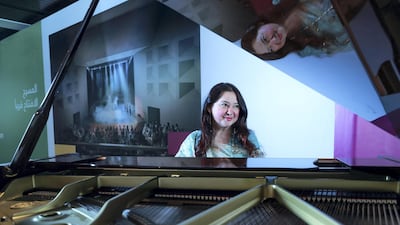“I would play for eight to 10 hours,” says the pianist Julia Podsekaeva. “I don’t get tired. I love to entertain!”
Ms Podsekaeva was a fixture of the old Cultural Foundation in Abu Dhabi before it closed 10 years ago. When it reopened last December, many who remembered it from before were overjoyed to see the site almost exactly as it was: the same coloured tiles, the geometric wooden chandeliers, and Ms Podsekaeva herself, still playing on the upstairs balcony overlooking the main hall.
“When they opened again, I returned,” she says. “As Rita [Aoun-Abdo, executive director of the culture sector] says, it is your place: you belong to this place.”
She is once again playing for the foundation's guests, accompanying them on her grand piano as they gather for events throughout the week.
Ms Podsekaeva was born in Russia to a musical family and was playing Rachmaninoff at nine years old. She went on to study piano and composition at the famed Moscow Conservatory, and trained as an opera singer. When she came to the UAE 21 years ago, it was only supposed to be for a five-month contract to play at a beach hotel. But within 23 days, she says, she had been enticed to perform at the Cultural Foundation, and she has been playing in Abu Dhabi ever since.
When the foundation closed in 2008, many of their activities moved to the National Theatre, further downtown. Ms Podsekaeva moved there, too, using it as a base to teach piano lessons, but she jumped at the opportunity to return to the original site.
With a bright colour palette appearance and steady stream of conversation, the pianist is a force of energy, rattling off dates (“I started playing at the Cultural Foundation on May 28, 1997,” she notes) and favourite composers (“Korsakoff, Fairouz, Mozart, Brahms”) in nervous succession. But once she is behind the piano, her demeanour changes: everything flows out on to the keys and she becomes visibly calmer, half engaged in the music, half listening to what’s around her or greeting friends who stop by. Her piano, on the right-hand side of the foundation's first floor, sits within the long balconies that open on to the main atrium.
“I play and talk, play and talk,” she says. “Children would come over and say, ‘play with closed eyes!’ So I do tricks.”
After an initial trial at the Cultural Foundation, she became a regular there, playing before lectures, exhibition openings, screenings and plays. She teaches music to Abu Dhabi schoolchildren, and performs at private residences as well, and, over the years, she has played to a star-studded list that includes Sheikh Mohammed bin Zayed, Crown Prince of Abu Dhabi, Sheikha Fatima bint Mubarak, wife of founding president Sheikh Zayed, the Queen of Nepal and American politician Madeleine Albright, the latter at a Christmas tea. At one private event, she says, music producer Quincy Jones listened her for four hours straight.
And she knows how to play to a crowd. “I recognise the nationality of the tourists watching and play for them,” she recalls of her time in the 1990s and 2000s at the Cultural Foundation before it closed. “Indian music, Filipino, Chinese, Korean, Spanish and American – I can play it all.
“The most emotional audience by far is Italian,” she says, describing an incident when she overheard a group of Italians in the foyer and switched to Verdi for them. They came upstairs and sang the opera parts with her. Afterwards, everyone working in the Cultural Foundation offices stepped outside of their rooms and clapped.
“These walls remember so much beautiful music from all the nations of the world,” she says, surveying the corner of the world that she has made her own. “When they see me, people often think I am an Arab. Why not? I am proud to represent this country.”


